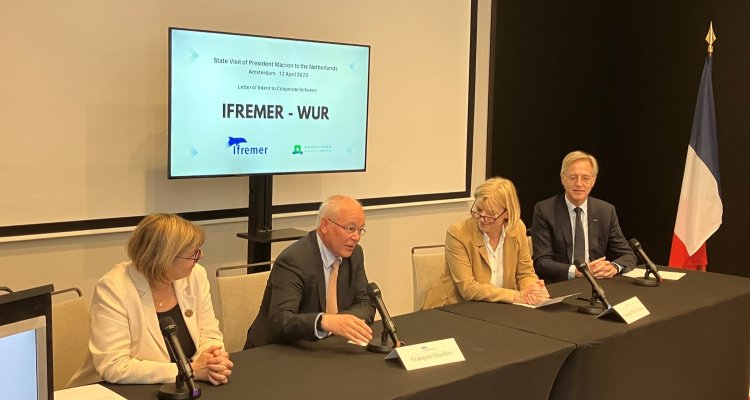Wageningen University & Research signs new agreements with French knowledge institutes
Wageningen University & Research (WUR) is entering into a new collaboration with two French knowledge institutes: the marine-focused Ifremer and INRAE, which focuses on agriculture and food production. The agreements and the signing thereof are part of the so-called Innovation Pact between France and the Netherlands.
This Innovation Pact aims to intensify the collaboration between the two countries to innovate in several domains, including ‘Securing Food Transition’. For Wageningen, these two new collaboration agreements mean joining forces in the fields of, among others, the protein transition, robotics, digitalisation, biotechnology, sustainable fisheries and aquaculture for the food systems transition and the innovative power of the agritech and food tech sectors.
INRAE and WUR
INRAE, founded on 1 January 2020, is a public institute for scientific and technical research (EPST), which originated from a merger between the French national institute for agricultural research INRA and IRSTEA, the French national research institute for agricultural and environmental sciences. WUR has an extensive history of collaboration with these two institutes. This new collaboration will focus on the food transition and how both institutes can contribute by joining forces. INRAE can help Wageningen scientists by teaching them how to engage in European projects. Moreover, INRAE is a key driver behind agroecology research. On the other hand, Wageningen has in-depth know-how of the protein transition; how do we switch from mainly animal-based protein production to plant-based production? And how can technology help us achieve a more sustainable food system?
Ifremer and WUR
Ifremer and WUR share a sense of responsibility for and commitment to the sea. The two countries share the Channel region and the North Sea, which are managed at a European level, and require solid knowledge and information for their responsible management, protection and exploitation. Examples include more sustainable fisheries, new forms of aquaculture and the effects and applicability of wind turbines at sea. This new collaboration agreement enables WUR to underscore these joint interests and to emphasise its ambition to intensify its collaboration, resulting in new projects, new knowledge, innovation and know-how.
New collaboration, old acquaintances
WUR has a long-standing history of intensive collaboration with INRAE in the area of European research and innovation projects and, more recently, in the domain of education. Moreover, the two institutes collaborate within various European research networks. For many years now, WUR and INRAE have been considered the two leading research organisations in Europe in the domains of nutrition, bio-economy, natural resources, agriculture and environment.
WUR and INRAE have been jointly involved in over 140 European research projects, including projects focusing specifically on robotics, biotechnology (including plant and animal breeding), data and digitalisation, agriculture and food production and food transitions (including the protein transition). The two organisations are uniquely equipped to feed the innovation pipeline of agritech and food tech businesses in France and the Netherlands.
WUR and IFREMER have an extensive history of collaboration in the field of fish stock management, fisheries and marine-ecological research. The two parties strive to expand the existing collaboration, in part due to the emergence of energy production (wind/solar/tidal) at sea and the need for more selective, sustainable fisheries methods. A better understanding of the sea as a source of food, energy and biodiversity is central to this ambition, as are technical innovations in the domains of AI, robotics, image recognition and data science.

